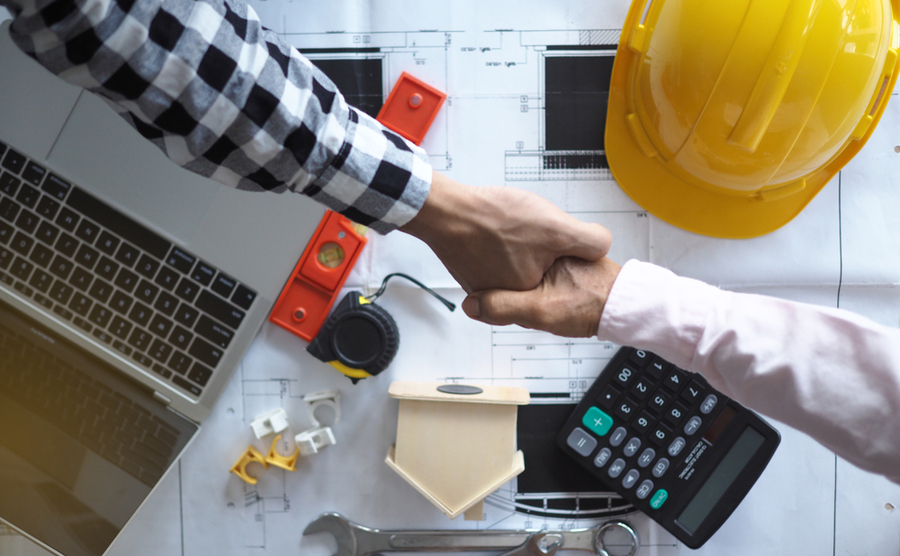Whether you’re having your home built from scratch or just need your patio resurfaced, finding a builder in Spain is easy. But where do you start, what will you pay and what are the local rules about building? In part 3 of our series on self-building in Spain, we’ve got to the business end of the process.
In part one of our self-building in Spain series we looked at buying your building plot. In part two we investigated getting your architect and applying for planning permission in Spain. Now you just need to get it built.
FIND your property in Spain
For a whole house there will be not just one builder, but a range of specialists. That will include plumbers, electricians, landscapers, glaziers, roofers and many more. As a newbie in Spain your best bet is usually to hire a contractor whose job it is to oversee the entire construction, and to make sure the build is finished on time and on budget. You can choose to hire speciality contractors for each aspect of the build yourself, but costs can really add up, time delays are more common, and it will require a whole lot more admin on your part.
For a painless way to get your own home built in Spain, buy off-plan from a developer. Download your FREE Spain Off Plan Guide
Given that building comes at the end of the process, by which time you should be well-acquainted with a lawyer, estate agent and architect as a bare minimum, possibly even a surveyor and other professionals too, you’re unlikely to be short of introductions to a builder. Ask your professional contacts to suggest a selection of building firms. Do be aware that he or she might be earning commission from them.
Now you have certain decisions to make.

Agreeing a price with everything listed is essential
Local or fellow expat?
This can be a controversial topic, but the essential questions to ask are: who will you feel most comfortable with and who will get it built to the correct quality, timescale and budget? It is, after all, your home. It’s great to use local builders if possible, for all sorts of reasons. You’ll be living here, and will want to make friends within the local community. A local builder should understand specialist local conditions; to do with climatic conditions, for example. And don’t assume that they won’t speak English – many will.
In Spain, the British and other international residents have become such a fixture than in many areas there will hardly any difference anyway. Is a Briton who’s been building here for 25 years really an outsider any more?
If you do choose to go with a non-Spanish builder, however, you need to check if they are registered on the Spanish system and ensure they follow all Spanish laws and building practices.
Smaller projects
If you’re having a smaller piece of building work done, such as creating a new patio, word of mouth should be sufficient guarantee of finding a builder who can handle the project. Your estate agent will be a mine of information too. The local version of the Yellow Pages and local newspapers – whether online or on paper – will list them and then it’s simply a matter of checking they are capable.
You will probably need some Spanish or a friend to help communicate with builders this way but it is likely that you will find a good local artisan through these portals.
Having had some replies from the internet or other medium, the first thing to consider is what references they offer you. If they don’t willingly offer any, are they just being taciturn or can they be trusted!? One objective clue will be if they are a member of a trade association or organisation, such as ANCI.
Contracts
For larger projects such as building your entire home, you will need to employ a specialist lawyer and an architect to handle contracts. Among other things they will be checking the legal status of the builder and ensuring that the money you pay is protected. Building guarantees are a specialist legal area in Spanish property, with strong protections for clients, so you should have peace of mind. Most will offer a 10 year guarantee on their work.
You are likely to be making state payments, but these have to be protected. For materials, builders will tend to make money where they can and this can extend to skimming a little (or a lot) off the top for materials. A contractor or a good architect should protect you from this. For smaller jobs, if you are sourcing your own materials from salvage yards or other outlets, tell your builder that you will be doing this before signing any contract. Order your goods well in advance so that they are on site when needed.
Get in touch with a trusted Spanish property lawyer
Costs
Let’s look at all the possible costs you will face if building your home on land that you have purchased. This is a rough guide:
- Land generally costs in the region of 45% of the total costs but could be more or less depending on the site.
- Count on 40% for the actual construction work.
- Around 8% of the total cost will go on fees.
- A further 7% is needed for taxes and permissions.
Costs will vary depending on whether your land has access to any utilities and how close it might be to a public road.

Building in the sun isn’t exactly child’s play, but it’s far from impossible!
Timescales and work practices
Typically, a house build will take six to 12 months and follow this order:
1 – Grading and site preparation
2 – Foundations
3 – Framing
4 – Installation of doors and windows
5 – Roofing
6 – Siding
7 – 1st stage of electricals
8 – 1st stage of plumbing
9 – 1st stage of heating/ air-conditioning
10 – Insulation
11 – Drywall
12 – 1st stage of flooring
13 – Trim
14 – Painting
15 – Finalise electrics
16 – Install kitchen and bathrooms
17 – Finalise plumbing
18 – Carpeting and flooring
19 – Finalise heating/ air con
20 – Connect to mains water/ electricity
Spanish builders work hard, usually from 8am to 6pm. They are quite likely to disappear around 10.30 to 11am for their ‘second breakfast’ in the nearest bar. This is quite normal. Lunch is generally a two-hour break somewhere between 1pm and 4pm.
With a building time of up to a year or more, a moving exchange rate can play havoc with your costs. Fortunately the problem is easily solved with a forward contract from a currency specialist, and it won’t cost you a penny more. Read the Property Buyer’s Guide to Currency here.
Other important tips
If you are tempted to do some of the building yourself, you really need to check on local building regulations as they may not be the same is in the UK. You will also need to tell your architect/lawyer/builder that you plan to do this in advance of signing any contract. Perhaps you were a plumber in the UK? Be aware that the norms in both the UK and Spain differ and likewise for electricity.
Pay your builder in stages and keep 5% to 10% back until you are happy with the final construction work. ‘Snagging’ is another specialist area in Spain, with plenty of online help.
For a painless way to get your own home built in Spain, buy off-plan from a developer. Download your FREE Spain Off Plan Guide
Construction work usually stops in August. This is according to local bylaws but it is really so that holidaymakers can enjoy themselves without the problem of noise and excessive dust coming from construction sites.
Check for a “termination” guarantee from the builder in case he or his company goes bust before completion of the project. This guarantee should be underwritten by an insurance company or bank.
Be involved! It is much better if you are around to visit the site on a daily basis and control to some extent what is going on. Some decisions need to be taken quickly and so it is really worthwhile being on the spot so as not to hold up proceedings.
Expect some hitches. Even in the best constructions there are always some unknown elements. Be prepared for them and don’t fly off the handle if something doesn’t go according to plan. Remember you are dealing with humans, just like yourself! Being calm and receptive is the best way to deal with the unexpected problems.











